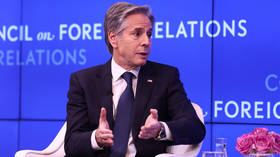‘Malicious and ill-intentioned’: Beijing accuses US of trying to sabotage major infrastructure project with Pakistan
China has accused the US of trying to “drive a wedge” between it and Pakistan by insisting that an ambitious $60 billion infrastructure and energy project between the two countries is only beneficial to Beijing.
Washington has been warning that the China-Pakistan Economic Corridor (CPEC) will inflict a heavy debt burden on Islamabad, but its assessment has been repeatedly rejected by both the Chinese and Pakistani foreign ministers.
Speaking to media on Tuesday, Chinese foreign ministry spokesman Geng Shuang said the US “ignores the facts and continues to use the so-called debt issue to disrupt CPEC development and drive a wedge between China and Pakistan.”
Washington’s so-called concerns are “so malicious and ill-intentioned,” he added.
Also on rt.com Trade war escalates? Beijing points finger at IMF as US berates Chinese megaproject in Pakistan for debt-trappingThe latest concern was expressed by US diplomat for South and Central Asia Alice Wells, who warned China “is going to take a growing toll on the Pakistan economy” as unlike Washington it offers “loans,” but not grants. Pakistani foreign minister Shah Mahmood Qureshi responded that American opinions will have “no impact” on the large-scale project, which involves the construction of a new network or roads, railways and energy projects.
“Pakistan does not agree with [the US] view. We have rejected that view. We do not think that the burden of the CPEC will increase our debt burden,” Qureshi said.
Chinese Ambassador to Pakistan Yao Jing also rejected US statements, saying that Beijing would not force Pakistan to pay its debts on time if it were in need, unlike the West-governed IMF, which is “strict in its repayment system.”
Like this story? Share it with a friend!














